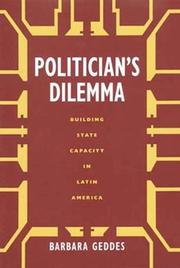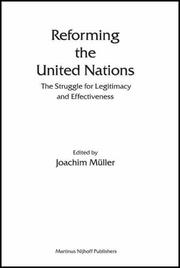| Listing 1 - 4 of 4 |
Sort by
|
Book
ISBN: 9786612697692 1282697692 0520945808 9780520945807 9781282697690 9780520259188 0520259181 6612697695 Year: 2010 Publisher: Berkeley University of California Press
Abstract | Keywords | Export | Availability | Bookmark
 Loading...
Loading...Choose an application
- Reference Manager
- EndNote
- RefWorks (Direct export to RefWorks)
Kären Wigen probes regional cartography, choerography, and statecraft to redefine restoration (ishin) in modern Japanese history. As developed here, that term designates not the quick coup d'état of 1868 but a three-centuries-long project of rehabilitating an ancient map for modern purposes. Drawing on a wide range of geographical documents from Shinano (present-day Nagano Prefecture), Wigen argues that both the founder of the Tokugawa Shogunate (1600-1868) and the reformers of the Meiji era (1868-1912) recruited the classical map to serve the cause of administrative reform. Nor were they alone; provincial men of letters played an equally critical role in bringing imperial geography back to life in the countryside. To substantiate these claims, Wigen traces the continuing career of the classical court's most important unit of governance-the province-in central Honshu.
Cartography --- History. --- Nagano-ken (Japan) --- Japan --- Historical geography. --- Administrative and political divisions --- Maps --- administrative reform. --- asia scholars. --- asian studies. --- cartographers. --- cartography. --- classical maps. --- coup detat. --- early modern japan. --- geographical documents. --- government impact. --- historical geography. --- historical. --- honshu. --- imperial geography. --- ishin. --- japan. --- japanese countryside. --- japanese geography. --- japanese history. --- map rehabilitation. --- maps. --- meiji era. --- nagano prefecture. --- political history. --- regional cartography. --- restoration. --- shinano. --- tokugawa shogunate.

ISBN: 0520918665 0585098328 9780520918665 9780585098326 0520072502 0520207629 Year: 1994 Publisher: Berkeley University of California Press
Abstract | Keywords | Export | Availability | Bookmark
 Loading...
Loading...Choose an application
- Reference Manager
- EndNote
- RefWorks (Direct export to RefWorks)
In Latin America as elsewhere, politicians routinely face a painful dilemma: whether to use state resources for national purposes, especially those that foster economic development, or to channel resources to people and projects that will help insure political survival and reelection. While politicians may believe that a competent state bureaucracy is intrinsic to the national good, political realities invariably tempt leaders to reward powerful clients and constituents, undermining long-term competence. Politician's Dilemma explores the ways in which political actors deal with these contradictory pressures and asks the question: when will leaders support reforms that increase state capacity and that establish a more meritocratic and technically competent bureaucracy? Barbara Geddes brings rational choice theory to her study of Brazil between 1930 and 1964 and shows how state agencies are made more effective when they are protected from partisan pressures and operate through merit-based recruitment and promotion strategies. Looking at administrative reform movements in other Latin American democracies, she traces the incentives offered politicians to either help or hinder the process. In its balanced insight, wealth of detail, and analytical rigor, Politician's Dilemma provides a powerful key to understanding the conflicts inherent in Latin American politics, and to unlocking possibilities for real political change.
Bureaucracy --- Civil service reform --- Merit system --- Spoils system --- Patronage, Political --- Interorganizational relations --- Political science --- Public administration --- Organizational sociology --- History --- Latin America --- Politics and government --- administrative reform movements. --- analytical. --- channel resources to people and projects. --- detailed. --- insure political survival and reelection. --- latin american politics. --- political actors and contradictory pressures. --- possibilities for real political change. --- rational choice theory. --- state resources for national purposes. --- study of politics in brazil.
Book
ISBN: 1283519291 9786613831743 140084195X 9781400841950 6613831743 9780691148403 0691148406 9781283519298 Year: 2012 Publisher: Princeton, NJ
Abstract | Keywords | Export | Availability | Bookmark
 Loading...
Loading...Choose an application
- Reference Manager
- EndNote
- RefWorks (Direct export to RefWorks)
The Making of Modern Liberalism is a deep and wide-ranging exploration of the origins and nature of liberalism from the Enlightenment through its triumphs and setbacks in the twentieth century and beyond. The book is the fruit of the more than four decades during which Alan Ryan, one of the world's leading political thinkers, reflected on the past of the liberal tradition-and worried about its future.This is essential reading for anyone interested in political theory or the history of liberalism.
Liberalism --- History. --- Alexander Herzen. --- Alexis de Tocqueville. --- Autobiography. --- Bertrand Russell. --- East India Company. --- Enlightenment. --- Hannah Arendt. --- India. --- Isaiah Berlin. --- Jean-Jacques Rousseau. --- John Locke. --- John Rawls. --- John Stuart Mill. --- Joseph de Maistre. --- Karl Popper. --- L. T. Hobhouse. --- Leviathan. --- Marxism. --- Niccolo Machiavelli. --- On Liberty. --- Samuel Taylor Coleridge. --- T. H. Green. --- The Subjection of Women. --- Thomas Hobbes. --- Vietnam War. --- Whig Revolution. --- World War II. --- absolutism. --- adjectival freedom. --- administration. --- administrative reform. --- adverbial freedom. --- anti-Americanism. --- anti-imperialism. --- atomism. --- authority. --- autonomy. --- brutalization. --- bureaucracy. --- capitalism. --- civil service. --- coercion. --- communitarianism. --- community. --- criminal justice system. --- culture. --- death penalty. --- democracy. --- disenchantment. --- empire. --- epistemological antiauthoritarianism. --- equality. --- ethics. --- fairness. --- free will. --- freedom of speech. --- freedom. --- government. --- human nature. --- human rights. --- incarceration. --- individualism. --- individuality. --- inner life. --- intervention. --- justice. --- law of nature. --- legitimacy. --- liberal anxieties. --- liberal community. --- liberal education. --- liberal imperialism. --- liberal interventionism. --- liberalism. --- libertarianism. --- liberty. --- marriage. --- mechanical materialism. --- meritocracy. --- moral authority. --- natural rights. --- natural theology. --- obligation. --- opinion. --- ordinary language philosophy. --- ordinary warfare. --- pacifism. --- participatory democracy. --- passivity. --- patriotism. --- philosophical engineering. --- philosophy. --- physics. --- physiology. --- pluralism. --- poetry. --- political liberalism. --- political obligation. --- political philosophy. --- political theory. --- politics. --- progress. --- property. --- psychology. --- punishment. --- rationality of science. --- red terror. --- religion. --- religious authority. --- religious belief. --- religious dissent. --- republicanism. --- rights. --- romantic conservatism. --- science. --- self-assertion. --- self-maintenance. --- self-preservation. --- self-realization. --- self-sufficiency. --- social identity. --- state. --- terror. --- terrorism. --- terrorist states. --- toleration. --- utilitarianism. --- utility. --- violence. --- welfare state. --- white terror.

ISBN: 1281399221 9786611399221 9047409604 9789047409601 9004151311 9789004151314 Year: 2006 Publisher: Leiden ; Boston : M. Nijhoff Publishers,
Abstract | Keywords | Export | Availability | Bookmark
 Loading...
Loading...Choose an application
- Reference Manager
- EndNote
- RefWorks (Direct export to RefWorks)
The United Nations is in need of reform. There has always been widespread agreement that this is the case – indeed throughout the 60-year history of the Organization. Differences over the best cure reflect the political confrontation between its 191 member states. The institution has been criticized to lack legitimacy, to need accountability and to be inefficient with a bloated bureaucracy. Recently, allegations of mismanagement and corruption in the Oil-for-Food Program have led to a crisis of confidence. The public debate followed reform initiatives for enlarging the Security Council, achieving the Millennium Development Goals, and establishing new collective mechanisms to protect human rights, counter terrorism and respond to crimes against humanity. Strengthening oversight, governance and management practices aimed at introducing fundamental institutional changes. The publication describes the reform process leading to the United Nations Summit in September 2005. The achievements remain disappointing with the failure to approve a grand bargain. A number of recommendations are put forward to facilitate the reform process in the United Nations, realising, however, that this will remain cumbersome and a lengthy step-by-step effort.
United Nations -- Finance. --- United Nations -- Management. --- United Nations -- Reform. --- United Nations Human Rights Council. --- United States -- Foreign relations. --- Treaties, International --- International Law --- Law, Politics & Government --- United Nations --- Reform. --- Management. --- UN --- UNO --- ADMINISTRATIVE REFORM. --- Hervormingen. --- INTERNATIONAL ORGANIZATIONS. --- ORGANIZATIONAL CHANGE. --- Verenigde Naties. --- DEVELOPMENT. --- HUMAN RIGHTS. --- INTERNATIONAL SECURITY. --- IRAQ. --- PEACE ENFORCEMENT. --- PEACEBUILDING. --- PEACEKEEPING OPERATIONS. --- PETROLEUM REVENUES. --- POVERTY MITIGATION. --- SANCTIONS. --- Reforma administrativa. --- Nações Unidas (ONU), --- Nations Unies --- Independent Inquiry Committee into the United Nations Oil-for-Food Programme. --- Millennium Summit (2000 : New York) --- UN Millennium Project. --- UN. High-Level Panel on Threats, Challenges and Change. --- UN. Human Rights Council. --- UN. Secretary-General. --- UN. Security Council --- Vereinte Nationen --- administração. --- Gestion. --- Réforme. --- Organizational reform. --- 2005 World Summit Outcome. --- Millennium Development Goals. --- Naciones Unidas --- ONU --- Organisation des Nations Unies --- Organizat︠s︡ii︠a︡ Obʺedinennykh Nat︠s︡iĭ --- OON --- Vereinigte Nationen --- Umot ha-meʼuḥadot --- Organizacja Narodów Zjednoczonych --- ONZ --- Forente nasjoner --- Forenede nationer --- FN --- Förenta nationerna --- Gaertʻianebuli erebi --- Organização das Nações Unidas --- PBB --- Perserikatan Bangsa-Bangsa --- Kokusai Rengō --- Kokuren --- ENSZ --- Egyesült Nemzetek Szövetsége --- Birleșmiș Milletler Teșkilâtı --- Birlăşmiş Millătăr Tăşkilatı --- Birlashgan Millatlar Tashkiloti --- BMT --- YK --- Yhdistyneet kansakunnat --- OUN --- Organizacija Ujedinjenih Nacija --- NU --- Nazioni Unite --- OSN --- Organizace spojených národů --- Sāzmān-i Milal-i Muttafiq --- Bangsa² Bersatu --- Organización de las Naciones Unidas --- Ühinenud Rahvaste Organisatsioon --- ÜRO --- Organismos tōn Hēnōmenōn Ethnōn --- Umoja wa Mataifa --- Vereinten Nationen --- Hayʼat al-Umam al-Muttaḥidah --- Verenigde Naties --- VN --- Organizația Națiunilor Unite --- Um --- Lien ho kuo --- OKB --- Organizata e Kombeve të Bashkuara --- Lian he guo --- U.N. --- Umam al-Muttaḥidah --- OĒE --- Hēnōmena Ethnē --- Organizácia Spojených Národov --- Sahaprachāchāt --- Națiunile Unite --- Organizat︠s︡ii︠a︡ na obedinenite nat︠s︡ii --- Organismos Hēnōmenōn Ethnōn --- Manẓūmat al-Umam al-Muttaḥidah --- AAN --- Arhanizatsyi︠a︡ Ab'i︠a︡dnanykh Natsyĭ --- Nações Unidas --- Orhanizat︠s︡ii︠a︡ Ob'i︠e︡dnanykh Nat︠s︡iĭ --- O.Ē.E. --- ʻOngkān Sahaprachāchāt --- Sjuninejal Konob'laq --- Sāzmān-i Milal-i Muttaḥid --- Milal-i Muttaḥid --- Nėgdsėn U̇ndėstniĭ Baĭguullaga --- NUB --- Rāshṭrasaṃgha --- או״מ --- أمم المتحدة --- الأمم المتحدة --- سازمان ملل متحد --- 国際連合 --- 联合囯 --- 聯合國 --- United Nations Organization --- Liên Hiệp Quó̂c --- Liên Hợp Quó̂c --- LHQ --- Kula Samagga --- YūʼAṅʻnʻ --- 联合国 --- Организация на обединените нации --- Организация Объединённых Наций --- Security, International --- National security --- Conflict management --- Human rights --- Sécurité internationale --- Sécurité nationale --- Gestion des conflits --- Droits de l'homme (Droit international) --- International cooperation --- Coopération internationale --- NATIONS-UNIES --- O.N.U. --- conseil de sécurité --- réforme --- REFORME
| Listing 1 - 4 of 4 |
Sort by
|

 Search
Search Feedback
Feedback About UniCat
About UniCat  Help
Help News
News